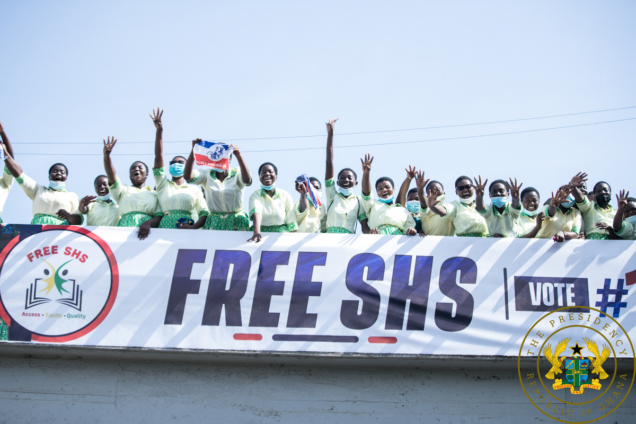Fresh data released by the Institute of Statistical, Social and Economic Research (ISSER) has revealed a troubling decline in net enrolment rates (NER) at the primary and junior high school (JHS) levels in Ghana.
Despite the successful implementation of the Free Senior High School (SHS) programme, these statistics have raised serious concerns about the sustainability and effectiveness of the education initiative.
ISSER has now called for a national discussion on the financing of the Free SHS programme, stressing the importance of balanced funding, collaborative efforts, and enhanced monitoring and evaluation.
The latest publication of the Social Development Outlook by ISSER indicates a significant decrease in NER at both the JHS and primary levels. Since 2017, the NER at the JHS level has steadily declined from around 50% to an average of 45% in 2020. Similarly, at the primary level, the NER has experienced a decline from an average of 91% to 80%. These findings, according to the elite research institution, indicate a worrying trend, suggesting a low transition rate from primary education to JHS and raising concerns about the overall health of the foundational education sector.
While the Free SHS programme has achieved remarkable success in increasing enrolment rates at the senior high school level, with NER rising from below 30% in 2017 to as high as 70% between 2019 and 2020, the decline in NER at the JHS and primary levels has sparked concerns about the long-term consequences of this policy.
While the initiative has expanded access to secondary education, it appears to have inadvertently shifted focus away from the fundamental levels of education.
ISSER has identified several key factors contributing to the decline in NER at the JHS and primary levels. One of the primary challenges is the delay in disbursing the school capitation grant, leaving schools struggling to operate without the necessary funds for nearly a year.
Furthermore, the routine delay or non-payment of school feeding caterers has become a distressing norm, compromising the provision of nutritious meals to students. These funding issues have created significant hardships for schools, impeding their ability to deliver quality education.
In response to these pressing challenges, ISSER has put forward a series of recommendations to address the declining enrolment rates and ensure the sustainability and effectiveness of the Free SHS programme. The recommendations include:
- Balanced Funding: ISSER emphasizes the need for the government to allocate resources equitably between the Free SHS programme and basic education, ensuring both sectors receive adequate funding to maintain and improve their quality.
- Addressing the Access-Quality Imbalance: Striking a balance between expanding access to education and maintaining high-quality standards is crucial. ISSER advocates for investment in infrastructure, teacher training, and educational resources to enhance the overall quality of education at the JHS and primary levels.
- National Discussion on Free SHS Financing: ISSER calls for a comprehensive national discussion involving policymakers, education experts, stakeholders, and the general public to critically examine the financing mechanisms of the Free SHS programme. This discussion aims to identify sustainable funding sources and address the challenges faced by the basic education sector.
- Collaboration and Stakeholder Engagement: ISSER emphasizes the necessity of effective collaboration among all stakeholders, including government agencies, educational institutions, communities, and parents. Such collaboration is vital in developing comprehensive solutions and ensuring the successful implementation of necessary reforms.
The call to action from ISSER serves as a wake-up call for policymakers and stakeholders to prioritise the basic education sector, provide adequate funding, and work collaboratively to overcome the existing challenges.
By taking these crucial steps, Ghana can pave the way for a brighter future where every child has access to quality education and the opportunity to reach their full potential.
Latest Stories
-
Ghana’s cocoa farmers lament low earnings amid high prices
59 mins -
Rainstorm caused power outages in Greater Accra Region – ECG
60 mins -
KODA’s family requests for privacy ‘to mourn and heal’
1 hour -
Kofi Adu Domfeh writes: When roads are constructed to kill
2 hours -
CAF Confederation Cup semi-final: We have the advantage – John Antwi
2 hours -
I hope that we’ll find a miracle – Céline Dion details Stiff Person Syndrome diagnosis
2 hours -
Government’s silence on energy crisis demonstrates a lack of leadership – Agyemang-Duah
3 hours -
Philipa Baafi bounces back with ‘Eda Ho Pefee’
3 hours -
Amazon Web Services and AmaliTech collaborate to train more than 5,000 people in cloud computing in Ghana
3 hours -
Inflation to decline to 24.6% in April 2024 – Report
3 hours -
Dancehall Queen Aklerh thrills patrons at EP listening
3 hours -
Bond market: Total turnover upturned to GH¢1.14bn
3 hours -
Stanbic offers financial solutions to members of Ghana Medical Association
3 hours -
“Dmusor” has brought businesses to their knees – GNCCI expresses frustration at ongoing crisis
3 hours -
Ghana’s electricity access likely to increase as World Bank begins initiative
3 hours

